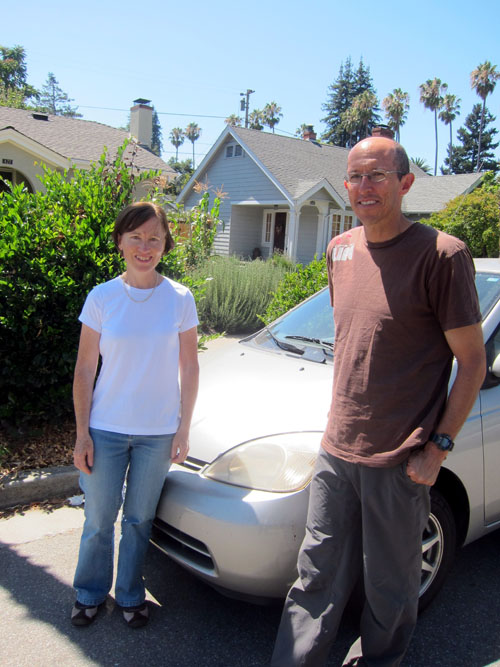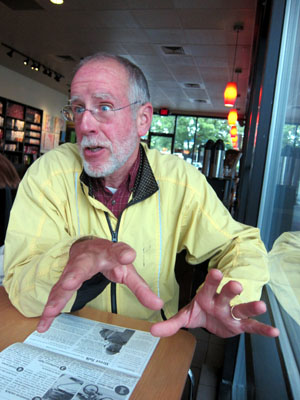Editor’s Note: On Tuesday, peer-to-peer carsharing pioneer Getaround announced a $1.7 million Federal Highway Administration grant that’ll bring the service to Portland. This guest post is by Michael Andersen of Portland Afoot, a 10-minute newsmagazine and wiki about low-car life in PDX. Michael adapted this piece from the magazine’s October cover story.
When it comes to Portland next month, peer-to-peer carsharing will be ready to slice and dice car ownership by letting any household turn their own car into a Zipcar.
But to Sightline readers—and to most folks who read my little newsmagazine for transit commuters—the concept of personal carsharing is old news. That’s why this summer, I took a trip straight into the future: south to San Francisco Bay, where the carsharing technology of tomorrow had been on the ground for six months.
Forget the concepts. I wanted to know the nuts and bolts: Who was sharing cars? What were they charging? And how do you report carsharing income on your taxes?
I wound up interviewing carsharing experts up and down the coast. Here’s what I learned.
1) It’ll be available everywhere.

Mountain View, Calif., is a South Bay city so committed to suburbia that zoning laws forbid homeowners from removing their garages. That low density makes it the kind of town that Zipcar, whose every vehicle must be driven about six hours a day in order to break even, can’t penetrate: there isn’t a single public Zipcar in city limits.
But Getaround has 15 cars in Mountain View. Why? Because private car owners don’t need to recoup the entire cost of their car through sharing. They just want a little cash on the side. This is the promise of personal carsharing: it makes one-car households possible in any neighborhood.
“It’s going to allow carsharing to operate in much less dense areas,” said Dave Brook, who invented commercial carsharing in Portland in 1998. “It changes the economics of the carsharing company.” (Editor’s Note: Dave has also been a guest poster for Sightline.)
I tracked down three Getaround users in Mountain View to ask how it’s worked for them. Short version: it helps to work at home—and to live near the train station.
2) It’ll all depend on scoring a “Carkit.”

Carkits are Getaround’s name for the proprietary, user-installed boxes that allow keyless entry to private cars. Brook, now a carsharing consultant, estimates that once they’re in production, each will cost $400 to $500. Getaround plans to give away 500 free; after that, they might sell carkits to users or award them to the car owners who build up the most impressive peer reviews on Getaround.com.
For car owners, carkits will be the secret to steady revenue—the trick to becoming Kari Signor, who according to Getaround VP John Atcheson parked her Nissan Xterra in central San Francisco and is “basically living off her car income as she hikes around Peru,” he said. “The latest word back was, ‘I’m just going to keep doing this.'” (Editor’s Note: John Atcheson is also the volunteer chair of Sightline Institute’s board, a position that led him to his interest in car-sharing, not the other way around.)
3) It’ll include a hidden tax break.
Under Oregon law, you won’t be allowed to earn more annually than your car costs to operate—that’d require a commercial insurance policy. But according to Portland accountant Emily Kingan, it’ll be fine to deduct from your carsharing income the full IRS rate (currently 55.5¢) for each mile driven during carsharing … even though, because the renter buys the gas, your true cost per mile is probably 11¢ or less.
“Strange but true,” Kingan said. Yes indeed; Brook backs her up.
4) Libertarians will love it … if it can get off federal subsidies.
There was an audible gasp when, during an Oregon House committee hearing last spring on personal carsharing, a surprise guest strode to the front of the room.
It was John Charles of the Cascade Policy Institute, a Portland-based free-market think tank so committed to auto transportation that it sometimes sends people to observe little-used bike lanes, counting cyclists in order to ridicule their small numbers. Had he arrived to kill the carsharing bill?
Charles began speaking almost shyly. “I wasn’t actually going to testify,” he explained. “I’m waiting for another bill. But I’m fascinated by the whole conversation. … Owners can get into business without years of delay. Owners can set their own rates based on the type of vehicle they have: $10 an hour, $8 an hour, $50 an hour. … Consenting adults can voluntarily engage in transactions where mutual gain is perceived. … Wonderful concepts.”
Charles quietly left the stand. The bill passed 47-10.
5) It’ll be a back door to mileage-based insurance.
For years, usage-based auto insurance – paying by the mile or hour driven, not by the month – has been the sweetest dream of transportation wonks. But insurers have resisted. The solution? Carsharing. Insurance is paid by the hour, but negotiated in bulk.
Getaround VP John Atcheson said the firm put huge effort into persuading its insurer, Berkshire Hathaway, to charge Getaround based mostly on usage. Under Getaround’s policy, a car borrower receives a perfect duplicate of the car owner’s coverage—but Getaround doesn’t pay a penny until she actually slips behind the wheel.
Portland Afoot’s December cover story looks at East Portland’s 10 dumbest transportation problems. Sightline readers in the Portland area can subscribe for $10 a year with discount code SIGHTLINE.


Comments are closed.